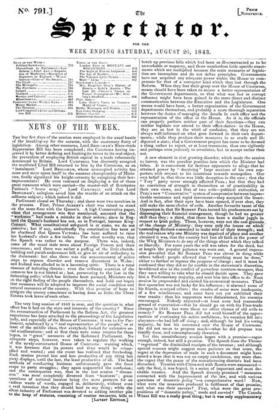NEWS OF THE WEEK.
THE last few days of the session were employed in the usual bustle of the breaking-up for the autumn, with the customary flurry of legislation. Among other measures, Lord BaouGuAat's Slave-trade Suppression Bill has been completed ; the Commons having im- proved it by better defining and limiting its terms to its real object, the prevention of employing British capital in a trade vehemently denounced by Britain. Lord CAMPBELL has discreetly accepted the mutilated Libel Bill returned to him by the Commons, as an " instalment." Lord BROUGHAM, whose unoccupied activity has more and more spent itself in the amateur championship of Minis- ters, finally signalized his knight-errantry by eulogizing their law- improvements! He even ventured on displaying a list of those great measures which were carried—the muster-roll of Bombastes Furioso's " brave army." Lord CAMPBELL said that Lord BROUGHAM'S eulogium saved him the trouble of an attack on the selfsame subject ; which indeed it did.
Parliament closed on Thursday; and there were two novelties in Ole process. First, Prince ALBERT'S chair was raised to stand on the same floor with the Queen's. A high Conservative paper, when that arrangement was first mentioned, assumed that the "workmen" had made a mistake in their orders; since in Eng- land the Queen's husband has not, as in Portugal, become King- Consort. What constitutional safeguard is at stake, we do not perceive ; but if any, undoubtedly the constitution has been so flir shattered that Queen VICTORIA has been suffered to raise her husband's chair a few inches. The other novelty was, that the Speech was rather to the purpose. There was, indeed, some of the usual stale news about Foreign Powers and their assurances; and there was rather a puffing of the little church- building and parish endowment bill, to give an air of orthodoxy to the document: but also there was the announcement of active steps to repress disorder and remove discontent in Wales : and Ireland was alluded to in a becoming spirit. There is a total absence of irritating threats ; even the ordinary coercion of the common law is not hinted at ; but, persevering to the last in the forbearing policy which has hitherto been pursued, Ministers rely on the right feeling of the people themselves, and hold out hopes that measures will be adopted to improve the social condition and natural resources of the country. With that promise of hope to mitigate the uneasy conscience at having done so little, the Three Estates took leave of each other.


























